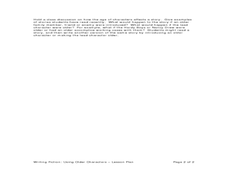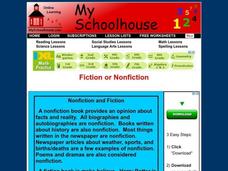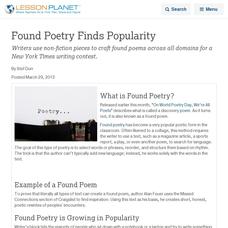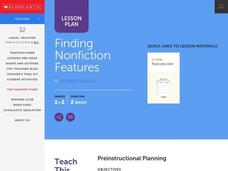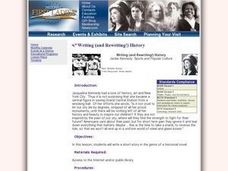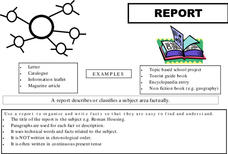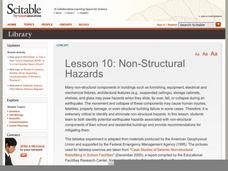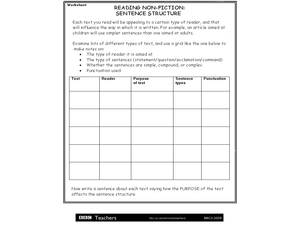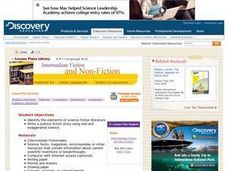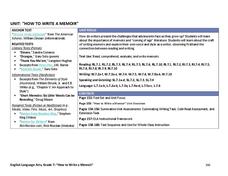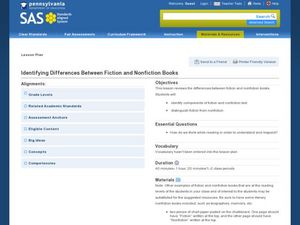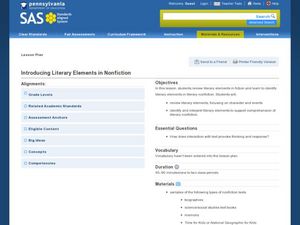Curated OER
Writing Fiction: Using Older Characters
Out with the old and in with the new? Not so in this lesson plan, which explores the idea of writing older characters in fiction. Students learn the value of varying their characters, exploring different perspectives, and avoiding...
Curated OER
Fiction or Nonfiction
In this online interactive fiction and non-fiction worksheet, students respond to 7 fill in the blank and multiple choice questions regarding the information included in the provided paragraphs.
Curated OER
Comparing and Contrasting Fiction and Nonfiction Using Graphic Organizers
Students compare and contrast fiction and non-fiction selections. In this writing skills lesson, students use different forms of graphic organizers to compare "The Three Little Pigs," to Wiesel's Night.
Curated OER
Found Poetry Finds Popularity
Writers use non-fiction pieces to craft found poems across all domains for a New York Times writing contest.
Curated OER
Is It Moose-Mooses or Moose-Meese?
Students play librarian and have to shelve books on moose after determining whether the books are fiction or non-fiction. They must study Alaska and follow a format of questions to determine where to shelve the books.
Curated OER
Finding Nonfiction Features
Students review the differences between a fiction and non-fiction book. In groups, they use different non-fiction books to identify the eleven features that distinguish it from a fiction book. To end the lesson, they create a chart...
Curated OER
Big Bushy Mustache: comprehension skills
In this comprehension skills activity, students read the book Big Bushy Mustache and complete comprehension activities. Students complete 5 activities including note taking, making inferences, fiction and non fiction, drawing...
National First Ladies' Library
Writing (and Rewriting!) History
Middle schoolers differentiate between fiction and non-fiction, discuss historical fiction, which combines both genres, choose historical novel from list and read independently, and write original short stories that combine elements of...
Curated OER
Non Fiction Posters
A set of very useful posters (in PDF) describing different types of non-fiction texts is here for you. While there isn't an activity, per se, in these worksheets, they could be used as a handy reference for learners who are engaging in...
PBS
Reading Adventure Pack: Money
Money is the topic of a reading adventure pack. Third graders read two books—one fiction, one non-fiction—and complete a series of activities. Learners draw an item they wish to save money for, examine coins to start a collection, and...
Nature
Non-Structural Hazards
Buildings often have decorative components and furnishings that can pose a hazard during an earthquake. Learners examine the classroom for such non-structural features. They consider fictional scenarios and discuss what actions would be...
Curated OER
Reading Non-Fiction: Sentence Structure
Use this worksheet to help make explicit the connection between sentence structure, audience, and author's purpose. Readers track and find patterns in sentence structure in various nonfiction texts, and connect it to the purpose of the...
Curated OER
Science Fiction Literature
Students identify the elements of science fiction literature. They write and illustrate a science fiction story using real and exaggerated science. In addition, they read their stories aloud in small groups.
Curated OER
Comparing Fiction and Nonfiction
Fifth graders compare and contrast an informational article with a fictional story. They read the story "The Contest" as a class, and discuss the different types of literature genres. Next, they complete a vocabulary worksheet and a...
Hood River County School District
Text Structure: Features and Organization
Teach learners how to interact with both fiction and non-fiction text with a packet of activities and worksheets. After looking over text structure and the difference in text features between different types of writing, readers analyze...
Louisiana Department of Education
How to Write a Memoir
Who are we and what shapes our identities? Seventh graders work to answer this question as they learn how to write a memoir. Full of non-print resources and supplemental texts that range from fiction to non-fiction, scholars write their...
PBS
Arthur’s World Neighborhood: Bibliography for Kids
Support young learners as they expand their cultural awareness with this list of children's literature on countries from around the globe. Including both fictional and non-fictional texts. This resource will help students across the...
Curated OER
Using Details from the Text
Explore non-fiction comprehension strategies with your class. They will visualize daily activities and label a 4 circle Venn diagram with related phrases. They must identify the overlapping sections as "main ideas," then complete a...
Curated OER
Identifying Differences Between Fiction and Nonfiction Books
Students explore the differences between fiction and non-fiction book. In this genre study lesson, students read examples of fiction and non-fiction and identify the characteristics of each genre. Students list the characteristics on a...
Curated OER
Fictional Hereos
Learners are introduced to the definition of a hero. As a class, they compare and contrast the difference between non-fictional and fictional hereos they have read about. They read a story, create a story map of one of the heroes and...
Curated OER
Introducing Literacy Elements in Nonfiction
Explore nonfiction writing with your class. They will identify elements in nonfiction by reviewing elements of fiction. Then they use biographies, memoirs, menus, Time for Kids, and text books to identify elements of nonfiction. They...
Polk Bros Foundation
How to Summarize a Non-Fiction Passage
After reading a text, one way to find out how much your class comprehended is to ask your pupils to summarize. This worksheet helps class members prepare for writing a summary of a nonfiction text. They note down the topic, up to eight...
Curated OER
Come Fly with Me . . . Open a Book: Travels through Literature
This detailed overview of a curriculum unit suggests using travel literature to engage and stimulate your third graders’ interest in reading. The suggested reading list includes fiction and non-fiction materials and offers urban children...
Curated OER
Differences Between Fiction And Non-Fiction in the Library
Young scholars examine the differences between fiction and non-fiction books in the library by discussing kangaroos. They distinguish between facts about kangaroos, and using their imaginations and imagining what they would do with pet...
Other popular searches
- Non Fiction
- Non Fiction Text Features
- Non Fiction
- Non Fiction Writing
- Non Fiction Reading Passages
- Non Fiction Text
- Non Fiction Reading
- Non Fiction Reading
- Non Fiction Text Features
- Creative Non Fiction
- Elements of Non Fiction
- Non Fiction Graphic Organizer


